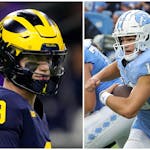 See
more of the story
See
more of the story
Baseball's economic system is brimming with inequities designed to enrich billionaire owners instead of millionaire players.
Young players under the euphemistic "team control" often play for a fraction of their value, logging time until they are eligible to be paid closer to what they are worth (arbitration, which is still team control) or the real prize, free agency.
But by the time they reach free agency, a lot of players have been dinged by injuries, age or other performance questions. Only the select few really cash in (even if all of them, just to be clear, are doing quite well financially in the big picture).
It is difficult to have this knowledge of the injustices of the system while coming to practical conclusions, but that's what I have attempted to do anyway — both here and on Tuesday's Daily Delivery podcast, when I was joined by Twins beat writer Phil Miller for a discussion about Jose Berrios.
If you don't see the podcast player, click here to listen.
Berrios absolutely deserves a big payday after the team control portion of his career ends after the 2022 season. Assuming he stays healthy and on the same productive trajectory, he will get paid quite well.
But it is also possible to think that ... and also conclude that, based on the cold calculations of baseball's economic system, that the Twins should not be the ones to pay Berrios that money. Rather, they should trade him — ideally, to maximize the most value, sometime in the next 10 days — and let someone else pay him.
It's not a fun conclusion to reach. But it's reality.
Berrios is going to be due for a contract that might reach $25 million a year. He'll be 28 entering free agency, meaning a five-year deal for $120-125 million total is a realistic number and term.
FanGraphs says Berrios has delivered the Twins a little over $100 million value already as a pitcher since entering the rotation full-time in 2017. That works out to about $25 million per full season (combining this one and 2020). He's been paid about one-tenth of that, which obviously isn't fair to the player. It's the reward given to teams for scouting and developing talent.
There's a reasonable chance that Berrios would live up to the value of a contract that paid him $25 million since that is what he has been worth. But sadly, paying good (but not great) players large market value contracts is not how teams like the Twins truly compete.
Instead, they squeeze the early year value out of players, then make hard decisions. If the player is good but not great (like Berrios), they often trade those players and hope to find younger, cheaper replacements.
If they're on a Hall of Fame trajectory, they pay those players. Even then, it sometimes doesn't work out (see Joe Mauer, whose $184 million, 8-year deal was derailed by injuries).
And the bottom line is this: Spotrac says the Twins have a payroll this season of about $127 million, No. 16 in the majors and right around league average. Can the Twins afford to have Berrios — a classic No. 2 or No. 3 starter, but not an ace and not likely to become one — making up 15% to 20% of future payrolls?
Probably not — at least if they want to compete for a World Series. It's a similar conundrum to the one the Wild faced with Ryan Suter and Zach Parise eating up tons of cap space all those years. Ditto for the Vikings and Kirk Cousins. Those are all good players. But paying a lot of money for players who are merely good will set a limit on how far you can go.
It's hard to imagine the Twins competing for a wild card spot or more in 2022 without Berrios. But it's even harder to imagine them truly competing for more than that in 2023 and beyond if they keep him.
That's the cold reality of baseball's business side. Berrios absolutely should get paid. But it should be by another team, after the Twins trade him. I think they will come to the same conclusion, even if it means some short-term pain.





